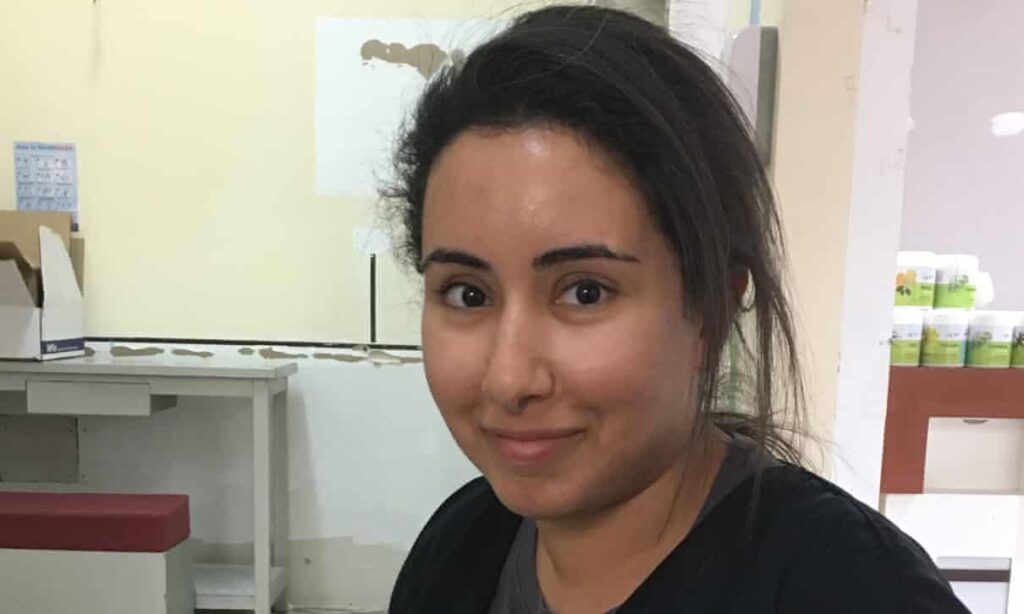Rebecca Nicholson
December 6, 2018, The Guardian
Sheikha Latifa bint Mohammed al-Maktoum vanished in February, apparently attempting to escape the UAE. This is the story of the tape she left behind

Escape from Dubai: The Mystery of the Missing Princess (BBC Two) has already made headlines, and no wonder – it is an extraordinary documentary, and tells a story so astonishing that at times even its participants are forced to admit that events sound far-fetched. But its director and producer, Jane McMullen, has resisted the urge to focus only on the harrowing drama of what happened to Sheikha Latifa bint Mohammed al-Maktoum, and has instead made a film that asks bigger questions of itself and its viewers: issues of money, political alliances and easily won PR; on the staggering reaches of technology; and on family, complicity and betrayal.
Princess Latifa is the daughter of Sheikh Mohammed bin Rashid al-Maktoum, the ruler of Dubai and the prime minister of the United Arab Emirates. She is one of 30 children, and the second who is known to have tried to escape from the “gilded cage” of her life. Her sister Shamsa ran away from a £75m Surrey mansion in 2000. Shamsa was captured weeks later in Cambridge and taken back to the UAE. After she alleged that she had been kidnapped on UK soil, the police officer put in charge of the case was denied permission to visit Dubai, and the investigation was dropped.
Latifa says her role as a PR coup for modern Dubai – she was fond of skydiving, which was reported as a sign of her freedom – is a sham. She says that women are “disposable”, that she is a captive and is watched and tracked at all times. She had made a break for it once before, when she was 16, only to be captured at the border. According to her, she was imprisoned and tortured for three years afterwards. The documentary’s narrator says that it is impossible to verify her claims, but that the details match previous accounts of torture there. And, by coincidence, her accounts chime with those of the British academic Matthew Hedges, who was jailed as a spy and subsequently pardoned.
We know this because Latifa left behind a tape, just in case. “They will, for sure, try to discredit this video – say it’s a lie, or it’s an actress or something,” she says, to the camera. But it is her insurance policy, and it will turn out to be her final grasp at autonomy. At the time she recorded it, she believed the elaborate plot to leave Dubai, seven years in the making, would be successful: “I am 99% positive it will work.” She had planned to escape from her driver, travel to Oman with a friend and then sail in a dinghy to a yacht stationed in international waters, captained by a French former naval officer, Hervé Jaubert, who himself escaped from the UAE, by scuba diving to safety, after being convicted of fraud. (He denies any wrongdoing.)
In the first moments of the programme, we learn not only that the plot failed, but that Latifa has not been seen since February, when the yacht was stormed by commandos, and she was taken away. It casts a heavy cloud. If only the documentary could be paused at the 37-minute mark, when every stage of the plan has been seen through and when Latifa’s optimism seems well placed.
This is a much bigger story, though, than that. The yacht sailed for days, on a course for India. Latifa believed she would be safe enough there to catch a flight to Florida, where she planned to claim political asylum. But India and the UAE had a strategic political alliance. Technological advances allowed her phone to be used as a tracker, even when switched off. She reached out to the media, believing publicity would keep her safe. But according to Tiina Jauhiainen, the friend and former gym coach who came with her, the story was so far-fetched that reporters did not appear to believe it. All of this is peppered with glorious footage of Dubai’s beaches, popular with British holidaymakers, in search of winter sun. The film is as light with its implications of complicity as it is damning. “I hope she is still alive,” says Jauhiainen, through tears.
There has been no comment by Sheikh Mohammed or the Dubai government on the allegations here. Sources have said only that Latifa is “with her family and doing excellent”. But this sober, shocking documentary – as lean and measured as its contents are inflammatory – may lead viewers to wonder what the worst outcome for her could have been. Perhaps it is more fitting to end on her own words, left on the tape, the tape that was there just in case the 1% scenario happened: “If I don’t make it out, I really hope that some positive change will happen from all of this,” she says.